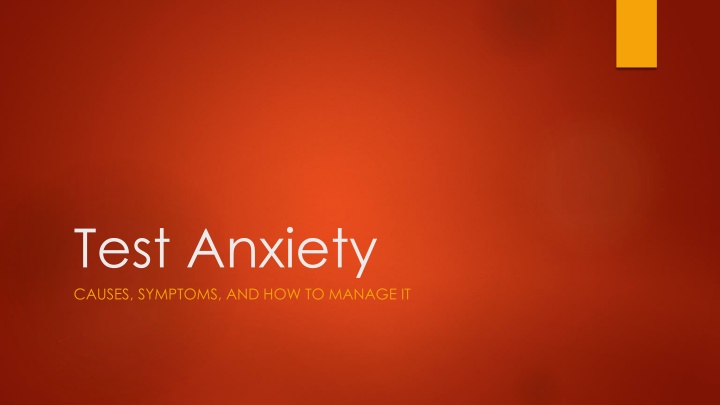
Test Anxiety: Causes, Symptoms, and Management
Explore the causes, symptoms, and effective ways to manage test anxiety to improve exam performance. Learn about the impact of fear of failure, lack of preparation, and past test experiences on test anxiety. Recognize physical, emotional, and cognitive symptoms of test anxiety. Discover tips for managing test anxiety through preparation, positive attitude, and relaxation techniques.
Download Presentation

Please find below an Image/Link to download the presentation.
The content on the website is provided AS IS for your information and personal use only. It may not be sold, licensed, or shared on other websites without obtaining consent from the author. If you encounter any issues during the download, it is possible that the publisher has removed the file from their server.
You are allowed to download the files provided on this website for personal or commercial use, subject to the condition that they are used lawfully. All files are the property of their respective owners.
The content on the website is provided AS IS for your information and personal use only. It may not be sold, licensed, or shared on other websites without obtaining consent from the author.
E N D
Presentation Transcript
Test Anxiety CAUSES, SYMPTOMS, AND HOW TO MANAGE IT
Learning Target 1)I will explore the causes of test anxiety. 2)I will be able to recognize the symptoms of test anxiety 3)I will understand how test anxiety can be managed in order to still do well on exams.
Causes of Test Anxiety Fear of failure. While the pressure to perform can act as a motivator, it can also be devastating to individuals who tie their self- worth to the outcome of a test. Lack of preparation. Waiting until the last minute or not studying at all can leave individuals feeling anxious and overwhelmed. Poor test history. Previous problems or bad experiences with test-taking can lead to a negative mindset and influence performance on future tests.
Symptoms of Test Anxiety Physical symptoms. Headache, nausea, diarrhea, excessive sweating, shortness of breath, rapid heartbeat, light-headedness and feeling faint can all occur. Test anxiety can lead to a panic attack, which is the abrupt onset of intense fear or discomfort in which individuals may feel like they are unable to breathe or having a heart attack. Emotional symptoms. Feelings of anger, fear, helplessness and disappointment are common emotional responses to test anxiety. Behavioral/Cognitive symptoms. Difficulty concentrating, thinking negatively and comparing yourself to others are common symptoms of test anxiety.
Tips for Managing Test Anxiety Be prepared. Develop good study habits. Study at least a week or two before the exam, in smaller increments of time and over a few days (instead of pulling an "all-nighter"). Try to simulate exam conditions by working through a practice test, following the same time constraints. Develop good test-taking skills. Read the directions carefully, answer questions you know first and then return to the more difficult ones. Outline essays before you begin to write.
Tips for Managing Test Anxiety Maintain a positive attitude. Remember that your self-worth should not be dependent on or defined by a test grade. Creating a system of rewards and reasonable expectations for studying can help to produce effective studying habits. There is no benefit to negative thinking. Stay focused. Concentrate on the test, not other students during your exams. Try not to talk to other students about the subject material before taking an exam.
Tips for Managing Test Anxiety Practice relaxation techniques. If you feel stressed during the exam, take deep, slow breaths and consciously relax your muscles, one at a time. This can invigorate your body and will allow you to better focus on the exam. Stay healthy. Get enough sleep, eat healthfully, exercise and allow for personal time. If you are exhausted physically or emotionally it will be more difficult for you to handle stress and anxiety.
Tips for Managing Test Anxiety Last Names A-Cl Counselor 254-6900 Serenity Santistevan ext 24109 Scott Jaggers ext 24104 Ann Kuhlman ext 24142 Karl Kane ext 24127 Lori Plantiko ext 24121 Nicole Hillegas ext 24111 Dean of Students Tom LeFebre ext 24216 Principal Ari Goldberg ext 24139 Assistant Principal 254-6900 Alicia Timbreza ext 24100 Visit the counseling center. We are aware of the toll exams can take on students. We can help you practice positive thinking and relaxation techniques. Cm-Gl Gm-La Carol Coburn ext 24103 Lb-N O-Sh Meghan Roenicke ext 24105 (Kyle Rush interim first quarter) Si-Z 10th- 12th Progress Monitor Robbie Owens ext 24278
Learning Target 1)I will explore the causes of test anxiety. 2)I will be able to recognize the symptoms of test anxiety 3)I will understand how test anxiety can be managed in order to still do well on exams.
